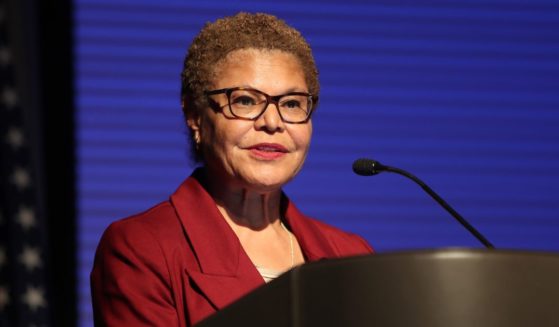Woman Quits High-Paying Job to Save Thousands of Orphans after Chance Encounter
We live in a culture where whoever has the most toys, wins. We collect the latest gadgets and fashions, while subscribing to the hottest health trend.
We can’t even imagine a world where WiFi or cellular service isn’t readily available. Instead, we fall into the trap that the “way of life” here in the States is a global phenomenon.
In truth, it’s not even a national phenomenon. Poverty strikes all parts of the globe, turning entire populations into invisible entities that draw resources from “the rest of us.”
Some, like media broadcast professional turned activist Caroline Boudreaux of Austin, Texas, even believed that those commercials featuring impoverished children in far off countries was a scam. When a friend invited Boudreaux to join her on a journey to meet the boy she’d long sponsored, Boudreaux even tried to talk her out of it, assuming that the picture was reproduced and sent to everyone who pledged money.
At the time, a young 30-year-old Boudreaux was living the life. She’d graduated college and landed a job working at a small television station.
She had the car, the house, the clothes, the social life — everything we’re supposed to hustle and strive to afford. But she wasn’t happy.
Yet this affluence did provide her with the ability to join her friend on a long slow voyage around the world. They reached India, the boy’s home, and found him waiting with the very first picture his sponsor had ever sent him.
It was a moment that would change Boudreaux forever. She’d never seen poverty; she couldn’t reconcile the conditions these children were in.
During the initial trip, the pair spent their time volunteering and were invited to an orphanage. The conditions they found there far surpassed anything the “squalor” depicted in “Annie.”
The children were bald from malnutrition, their evening meal was nothing but rice with a little beans. They were covered in dirt and slept on wooden slats where mold covered the walls.
Despite all their disadvantages, the children were friendly, welcoming, and loving, taking to the pair of visitors right off. Boudreaux knew that someone had to help these kids — and that it had to be her.
She went on to start The Miracle Foundation, tasked with “empowering orphans to reach their full potential.” Drawing from the 12 rights delineated by the United Nations convention of the rights of children, she implemented a scoring system by which she could compare the status and progress of orphanages in India.
Among the rights listed are many that are taken for granted here, including the influence of a caring adult in a stable and nurturing environment. Additionally, the right to live protected from abuse or neglect in dignified conditions is listed alongside the responsibility of adults to prepare them for successful adult life.
Equipped with this scoring system, she began to act — eventually partnering with over 50 orphanages in India, Ethiopia, Mexico, Sierra Leone, Sri Lanka, and Uganda with plans to expand their work into the Philippines and Egypt. Along with providing proper nutrition and bedding, the transformation process starts with the hiring of more “Housemothers.”
Housemothers are the adults that run the orphanage, often called “wardens.” Boudreaux wanted to change the connotation behind this child-adult relationship by changing the term to “housemothers” with the idea that mothers nurture.
More than changing a title, Boudreaux wanted to ensure that those hired genuinely cared for the children. She recalled the impression it made on one housemother when the first child called her “ma.”
Boudreaux was on to something. Just 6 months after starting with her first orphanage, the children were beginning to thrive. They were picking up weight, growing hair, and, by her assessment and photographs, smiled more.
Since, she’s worked with governments, non-governmental organizations (NGOs), special interest groups, and even the Vatican. The Miracle Foundation is on track to reach 22,000 children by 2020.
Conditions for the sponsored orphanages continue to improve, but Boudreaux can’t do it alone. At a TedTalk for Youth in 2015, she explained that there were three things we can do at home to help these orphans and those like them:
Remember — it’s easier to think the luxuries we have, and those we aspire to gain, are accessible to everyone. Yet for large chunks of the globe — particularly rural areas of developing countries — indoor plumbing isn’t commonplace.
Generate Awareness — don’t just remember and be grateful for what you have, tell others about what you know, what you’ve seen, what you’ve read about. When we’ve made a concerted effort to discuss these inequities, we’re less likely to forget these people in the first place or get wrapped up in self-pity about our own false sense of poverty.
Raise Money — how often do one of those commercials come on and you dismiss it due to your own financial burdens? Speaking to young persons, Boudreaux understood that not everyone has the disposable resources to fund anti-poverty efforts abroad.
She didn’t give them an “out,” instead she encouraged them — and all of us — to give small and organize fundraisers in our communities. She inspired the youthful audience of Austin, Texas, to end the poverty-stricken circumstances of these orphans in our lifetime.
In spite of the consumer-based culture we find ourselves in, Boudreaux serves as another example of how money can’t buy happiness. Instead, she was able to find fulfillment in a life of service to orphaned children living in the absolute worst conditions worldwide.
Truth and Accuracy
We are committed to truth and accuracy in all of our journalism. Read our editorial standards.
Advertise with The Western Journal and reach millions of highly engaged readers, while supporting our work. Advertise Today.











